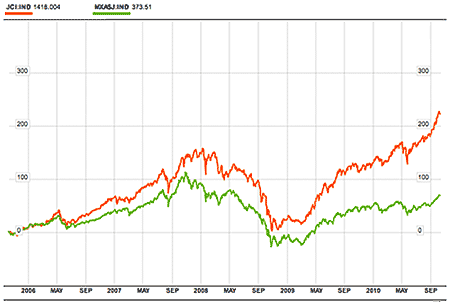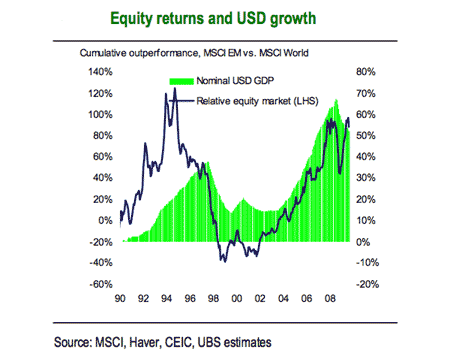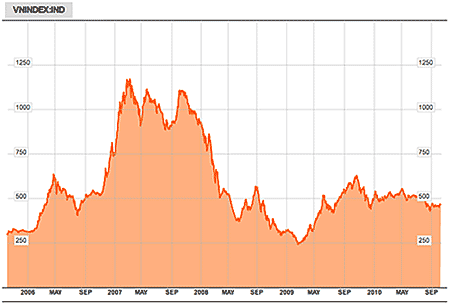Indonesia isn't a bubble yet – but investors should be wary
Indonesia's prospects look good for investors who can tough it out for the long term. But beware: compared to other Asian markets, Indonesia is extrememly volatile. And with Jakarta's stockmarket hitting record highs, a big sell-off is likely at some point, says Cris Sholto Heaton.

Get the latest financial news, insights and expert analysis from our award-winning MoneyWeek team, to help you understand what really matters when it comes to your finances.
You are now subscribed
Your newsletter sign-up was successful
Want to add more newsletters?

Twice daily
MoneyWeek
Get the latest financial news, insights and expert analysis from our award-winning MoneyWeek team, to help you understand what really matters when it comes to your finances.

Four times a week
Look After My Bills
Sign up to our free money-saving newsletter, filled with the latest news and expert advice to help you find the best tips and deals for managing your bills. Start saving today!
It's been a tale of two cities for me in the last 48 hours. Or perhaps a tale of two commutes. From Singapore's Changi airport, the metro whisks you quickly past hundreds of housing blocks and offices. There are no public signs of poverty; everything is clean, safe and organised.
The contrast within Indonesia is striking. From Jakarta's Soekarno-Hatta, your Bluebird taxi the only firm that most foreign visitors would consider using navigates traffic-clogged roads. Out of the window, tall modern towers, canal-side slums and everything in between roll into view. Shopping centres, hotels and condominiums form islands of wealth amid appalling poverty.
It's a very visible reminder how far one Asian economy has come and how far another still has to go.
MoneyWeek
Subscribe to MoneyWeek today and get your first six magazine issues absolutely FREE

Sign up to Money Morning
Don't miss the latest investment and personal finances news, market analysis, plus money-saving tips with our free twice-daily newsletter
Don't miss the latest investment and personal finances news, market analysis, plus money-saving tips with our free twice-daily newsletter
Investors must not confuse Asian markets
Of course, this comparison isn't at all fair. Singapore, like Hong Kong, Korea and Taiwan is a developed country. In fact, it's one of the wealthiest in the world. It shares history, geography and fast growth with its poorer neighbours, but it's certainly not an emerging economy.
Indonesia by contrast is poor. Its GDP per head was about $2,300 last year, compared with around $37,000 for Singapore. And the capital, uneven as it looks, is still wealthier and offers better prospects than much of the rest of the country. "Do you like Jakarta?", I asked my taxi driver, who had told me that he originally came from the smaller island of East Java. "Yes," he said. "I can work here."
This harks back to a point I made last week. Asian markets really can be very different to one other. It may seem an obvious point. But as Indonesia surges to further record highs (see chart below the orange line is the Jakarta composite and the green line is the MSCI Asia ex Japan), I wonder whether some of the investors discovering an enthusiasm for it really understand this.

Indonesia's long-term prospects are pretty good. And I would expect its market to produce higher returns than Singapore's over the very long run, certainly for foreign investors.
Why is that? Well, although researchers argue about whether growth and market returns are correlated, for emerging markets (EM) there seems to have been a connection in recent years. The chart below from Jonathan Anderson of UBS shows the cumulative outperformance of the MSCI EM index versus the MSCI World, together with cumulative growth in EM GDP, in nominal US dollars.

The history of the data is limited, as is often the case for EMs. But as you can see, when EM growth has been robust, EM stocks have outperformed. When it's been weak or in recession, they've underperformed. This makes sense foreign inflows have a big impact on many emerging markets and they tend to rise when growth is good. This is a topic we'll return to next week.
Indonesia is almost certain to have higher growth than Singapore over the long term. But at the same time, the performance of its market is likely to be much more volatile than a developed market, partly because of these volatile foreign flows.
Indonesia's stock market is about 50% of GDP. The government bond market is around 15% of GDP. The corporate bond market is highly underdeveloped at around 2% of GDP. I don't have flows data for the stock market handy, but foreign buying of bonds has been greater than new issuance this year: in other words, yield-hungry foreigners are net buyers of bonds while locals, concerned about rising inflation and the outlook for higher interest rates, are net sellers.
Can you ride out the downturns?
Jakarta valuations are up, but they're not too stretched. Foreign investors are very likely to make good money here over the long run. But at some point, a big sell-off is likely. Attitudes could sour if the economy or politics disappoints or even if global liquidity starts to shrink. And at least some investors will buy at the top and bail out when the market drops 30%, 40%, 50%.
The problem is that this could happen tomorrow or it could happen two years from now there's no way to tell. I see no obvious triggers right now, although investors might want to watch inflation the central bank is sounding a trifle overconfident that everything is under control.
So how do you invest in a market like Indonesia? For one thing, being unwilling or unable to ride out worrying developments is a good way to lose money: too many investors will panic and take a loss at the wrong moment.
But even if you are prepared to hold on, it can take a long time for foreigners to regain confidence. Remember that after the Asian crisis and the resulting recession and hyperinflation, it was almost a decade before Indonesia stopped being a pariah.
To take a less severe recent example, I've been saying the frontier investor's former favourite Vietnam is attractively valued for at least two years now, despite some shaky policymaking and currency devaluations. But most people don't seem to agree with me, as the market makes painfully clear (see chart below).

Investors who are comfortable with these real risks can invest in markets such as Indonesia and hope to make more money over the long term. Those who are not, but still want EM potential need to look at the Singapores of this world. They offer stability, a ride on their neighbours' progress and attractive valuations compared to other developed markets.
If you compare the Singapore market to the S&P 500, there's no question which I prefer.
Corporate attitudes are very different
You also need to understand that the entire stock market culture in a country like Indonesia can be very different. Take investor relations. When I travel, I obviously aim to meet as many companies as I can, both to research investments for my newsletter Asia Investor and for general background.
In Singapore, which has well-developed public relations and investor relations standards, you might get half or more of the meetings you request.
Expert tips for investing in Asia! Claim your FREE guides from MoneyWeek that include:
- How to go about investing to Asia
- Which brokers to use to buy foreign shares
In Indonesia, it's extremely difficult. Most companies don't have a designated investor relations contact. And many see little need to meet you. Often their liquidity is low and public trading is not at all a concern. The only real interest seems to be in a major investor who will do a block trade with an existing shareholder
To take one example, I was keen to meet Fastfood Indonesia, which has the local franchise for KFC. It's been doing pretty well. Chicken-based fast food should be a licence to print money this is a Muslim country where tens of millions will gain the spending power for casual dining in the years and decades ahead.
It trades just a few thousand shares a day, but it may not always be that way. But sadly I was completely unable to make contact with company.
Fortunately, not everything has been that disappointing and I'm working on a couple of interesting ideas. But it indicates the very different conditions that exist in a market like this. What could be a major consumer investment is effectively a private company that has little interest in raising its profile, even though it's technically a listed company.
Consumption looks solid, but the middle class is still small
As you know, I regard the Asian consumer market as an extremely promising, multi-decade investment theme. I spend a lot of time watching trends in this when I travel, so although I've only had a short time in the city so far, I've been pacing around some consumer hotspots.
Major malls in Jakarta seemed fairly busy, although in some older ones assistants often outnumbered customers. Obviously, when labour is cheap, high staffing levels aren't uncommon. But it seemed clear that there just aren't enough shoppers to go round, and so older facilities get left behind when newer ones open.
Many of these malls are selling middle-class brands. For example, Marks & Spencer and Debenhams have outlets in Jakarta via an Indonesian partner. But in a country as poor as this, the middle class is the elite. The vast majority of people cannot afford to shop in places like these.
I'm sure money can be made in this area, but for now there's a lot of supply chasing limited demand. Convenience stores like 7-Eleven and Circle K look better bets to me. These kinds of stores can still only cater to a minority of shoppers for now, but they are closer to having mass-market potential and will tap into rising incomes much more quickly.
In contrast to wealthier Asian cities where you'll see several of these on every street, there are relatively few around Jakarta. But I've been told the networks are expanding, although stores are still sufficiently scarce that I couldn't judge how true this is.
I can't see a pure way of investing in the retail chains, since the local master franchise is usually part of a bigger group. But convenience stores will help to expand the market share of packaged goods and improve their name recognition and brand power over time. And that should be good for a number of consumer firms, Indonesian and foreign, that aim to be the top sellers in an economy of 240 million people.
I'll be in Indonesia a few days longer and have more meetings and visits lined up. My impression is that the Indonesia story still stacks up on the ground, as I expected. But investors shouldn't get carried away everything will take time.
This article is from MoneyWeek Asia, a FREE weekly email of investment ideas and news every Monday from MoneyWeek magazine, covering the world's fastest-developing and most exciting region. Sign up to MoneyWeek Asia here
Get the latest financial news, insights and expert analysis from our award-winning MoneyWeek team, to help you understand what really matters when it comes to your finances.

Cris Sholt Heaton is the contributing editor for MoneyWeek.
He is an investment analyst and writer who has been contributing to MoneyWeek since 2006 and was managing editor of the magazine between 2016 and 2018. He is experienced in covering international investing, believing many investors still focus too much on their home markets and that it pays to take advantage of all the opportunities the world offers.
He often writes about Asian equities, international income and global asset allocation.
-
 Inheritance tax investigations net HMRC an extra £246m from bereaved families
Inheritance tax investigations net HMRC an extra £246m from bereaved familiesHMRC embarked on almost 4,000 probes into unpaid inheritance tax in the year to last April, new figures show, in an increasingly tough crackdown on families it thinks have tried to evade their full bill
-
 Average UK house price reaches £300,000 for first time, Halifax says
Average UK house price reaches £300,000 for first time, Halifax saysWhile the average house price has topped £300k, regional disparities still remain, Halifax finds.